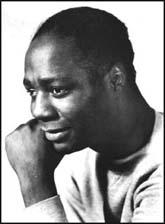Canada Lee

Lionel Canegata was born in New York on 3rd March, 1907. He attended school in Harlem but at the age of fourteen he ran away to be a jockey at Saratoga. After growing too heavy he became a boxer and eventually won the national amateur lightweight title. In 1926 he turned professional and adopted the name Canada Lee. He was a leading contender for the welterweight championship, but a detached retina forced to retire from the ring in 1933.
After a spell leading his own band, Lee became an actor with the Harlem YMCA, an organization subsidized by the Works Progress Administration. In 1936 he won critical acclaim as Banquo in the Federal Theater's Negro production of Macbeth. On Broadway he playedOthello, Kid Chocolate in Body and Soul, and Bigger Thomas in Native Son, a play based on the novel by Richard Wright. The New York Times described his performance as "the most vital piece of acting on the current stage."
Lee moved to Hollywood and appeared in Keep Pinching (1939), Farmer Henry Browne (1942), Lifeboat(1944), Body and Soul (1947), Lost Boundaries (1949) and Cry, the Beloved Country (1951).
After the war the House of Un-American Activities Committee (HUAC) began an investigation into the Hollywood Motion Picture Industry. The HUAC interviewed 41 people who were working in Hollywood. These people attended voluntarily and became known as "friendly witnesses". During their interviews they named several people who they accused of holding left-wing views.
One of those named, Bertolt Brecht, an emigrant playwright, gave evidence and then left for East Germany. Ten others: Herbert Biberman, Lester Cole, Albert Maltz, Adrian Scott, Samuel Ornitz, Dalton Trumbo, Edward Dmytryk, Ring Lardner Jr., John Howard Lawson and Alvah Bessie refused to answer any questions.
Known as the Hollywood Ten, they claimed that the 5th Amendment of the United States Constitution gave them the right to do this. The House of Un-American Activities Committee and the courts during appeals disagreed and all were found guilty of contempt of congress and each was sentenced to between six and twelve months in prison.
Those named were also called before the House of Un-American Activities Committee. Some refused to answer questions but others, such as Richard Collins, Budd Schulberg, Elia Kazan and Lee J. Cobb, named others who were fellow members of left-wing groups. If these people refused to testify and name names, they were added to a blacklist that had been drawn up by the Hollywood film studios. Lee, who had been a member of left-wing groups was one of those actors named as a communist.
Lee refused to testify and was blacklisted. Lee's name also appeared in the pamphlet Red Channels. This listed 150 people working in Hollywood who were known to have been involved in anti-HUAC activities. The American Tobacco Company threatened to remove its sponsorship of television shows unless Lee and other people mentioned in Red Channels lost their contracts. Unable to find work he called a press conference denying that he had ever been a member of the Communist Party. However, unwilling to testify before the HUAC, he remained blacklisted.
Canada Lee died of a heart attack on 9th May, 1952. Only forty-five years old, his family and friends claimed that the stress brought on by McCarthyism was a major factor in his early death.
Primary Sources
(1) Canada Lee, letter to Walter White of the National Association for the Advancement of Coloured People (April, 1952)
I can't take it anymore. I am going to get a shoeshine box and sit outside the Astor Theatre. My picture (Cry, the Beloved Country) is playing to capacity audiences and, my God, I can't get one day's work.
(2) Daily Worker, on the death of Canada Lee (13th May, 1952)
Those who joined with the torturers three and a half years ago now vulture-like seek to embrace their victim. Like one, the red-baiting obituary writers of the commercial press seize upon two sentences from the Negro actor while he was on the economic rack: "I am not a Communist or a joiner of any kind."
They could not make Canada Lee into a cold war stool pigeon. He fought for his dignity, even when he did not understand the nature of that flight.
Last updated: 16th August, 2002
